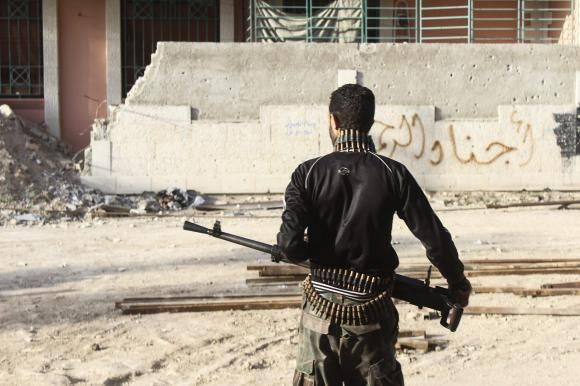Pro-Assad Forces Led By Hezbollah Kill 175 Rebels In Ambush In Syria, State Media Says

Forces loyal to Syrian President Bashar al-Assad and led by Lebanese Shi'ite militant group Hezbollah killed at least 175 Islamist rebel fighters in insurgent-held eastern outskirts of Damascus, state media noted on Wednesday.
Most of the fighters killed were Saudi, Qatari or Chechen nationals and belonged to the al Qaeda-linked Nusra Front or Liwa al-Islam, which is a Salafist Jihadi group and reportedly one of the largest and well-organized rebel units battling to overthrow Assad, according to Reuters.
Syrian Observatory for Human Rights, a monitoring group that opposes Assad, reported that Hezbollah carried out the ambush in cooperation with Syrian government forces. "Hezbollah was the main group that implemented the ambush," said Rami Abdulrahman, head of the Observatory, which is based in Britain and has sources in Syria.
If the bloody scale of the attack is confirmed, it would go down as a significant advance for al-Assad as he secure his tight grip on Damascus, Syria's capital, and its roads.
Images of dozens of casualties on a road heading through fields near Otaiba, which is in the Eastern Ghouta area outside of Damascus, were broadcast by Lebanon's Al Manar, a television station that Hezbollah operates.
Al Manar said that the Islamist fighers were ambushed while attempting to exit the area in order join up with fighting efforts in other regions. However, not a lot of details have been revealed about the attack, including when exactly it actually happened, according to Reuters.
In past three years of fighting in Syria, 140,000 people have been killed, according to the Syrian Observatory for Human Rights. The conflict started in March 2011 with street demonstrations demanding democratic reform before turning into a violent armed uprising after security forces started to clamp down on the protests.
As for the lastest attack, Al Manar said the fighters were trying to leave Eastern Ghouta to join battles in either the town of Deraa or the mountains of Qalamoun, though that report hasn't been confirmed.
© Copyright IBTimes 2024. All rights reserved.





















